5 WAYS TO PUSH THROUGH LOW MOTIVATION
ABOUT THE EPISODE
Struggling to find the motivation to do something? Learn 5 great tools for pushing through low motivation to help you be more productive and thrive.
TRANSCRIPT
Motivation isn’t something that you’re born with. It’s something that you can cultivate. It’s a muscle that you can build. Sometimes you just need the right tools to do it.
Hey Everyone, it’s Dr. Karen Kendrick, and welcome back to Mastery Now.
This week’s topic I’m so excited about because I think so many of us can relate to this, and that is this idea of low motivation. How do you actually push through when you’re not motivated? Because I know that so many of us feel this way a lot of the time, right? We don’t feel like doing stuff. We may feel physically not up to the task, or emotionally not ready to work on it, or just feeling mentally drained and not prepared or ready to work on something.
The difference between performing at a high level and a low level is that the high performers have figured out how to push through this. So you’ve got to master this too. You’ve got to figure out ways to reorient or even trick your brain, or sometimes even your body, into feeling ready for the task.
Now, that may sound kind of strange to say that you’re actually tricking your brain or your body, but there are proven techniques here that can really up your energy level, change your motivational state, to get more ready to do something and to go ahead with something.
So this is such an important skill to learn because there are going to be many times where we just don’t have the option to postpone, or we just don’t want to do something, but we’ve got deadlines and people depending on us and goals to meet. Or even our own sense of self-respect for following through on something and not quitting. So it’s important to really get good at this.
Now, there’s a lot of different strategies out there depending on who you talk with or what kind of things might have worked for you in the past. But I’m going to give you five ways that I know about in particular that I think are really good ways to get that motivation going again, when again, you just feel unmotivated.
Now, one thing I want to clarify about this is that what I’m talking about here is how to push through low motivation when it’s primarily emotionally driven. In other words, it’s not that you’re completely physically exhausted or you’re not completely mentally drained, because there are lots of other strategies for dealing with those two instances.
And so it’s actually not something that we want to cover here, just because there’s so many of those different strategies. I think it’s better to keep this episode tight and focus primarily on when it’s more of an emotional issue that you can shift a little bit more easily than when you’re dealing with complete fatigue or complete mental overwhelm.
I also want to just point out that, you know, you are going to build muscle in this over time. So as I go through these strategies, just know that, well, you may say, “Well, this would never work for me.” I’m going to encourage you to experiment because you can get better at this over time. You can just continue to practice this, work on it, and over time, it will get easier.
So just know that as we go through this, even if some of these don’t sound really natural to you right now, it will if you just give it a chance, and try it out. And then just see if you can, again, over time, start to adopt some of these strategies to get better at them.
So the first way to push through low motivation is just to do something very simple, which is just to do what I call “mental and emotional shifting.” You’ve got to shift away from the emotion that you’ve got going on, and the conversation you’ve got going on in your head that says, “Ugh, I don’t feel like doing this.”
Because I know we’ve all been there and those feelings and those thoughts come into our head. So when we stay focused on that negative emotion, our body tends to follow suit, right? When you have these negative feelings, it just brings your whole being down, and so it’s going to make you even more unmotivated. So you have to find a way to clear out those emotions that are in your head. So it’s really just about thinking about just about anything else except that feeling and that thought that “I don’t feel like doing this.”
So I think there’s a great example of this with Jacinda Ardern, who’s the Prime Minister of New Zealand, when she was asking for advice about how to juggle motherhood with Queen Elizabeth II. And so Queen Elizabeth’s response when Jacinda was asking her about how do you do it, you know, because, of course, Queen Elizabeth had four kids, Queen Elizabeth just said, “Well, just get on with it.” So in other words, you’ve got to stop focusing on all of the busyness in your head that’s saying, “You can’t do it” or “I don’t want to do it”, or whatever, and just move through it. I think that’s such simple but helpful advice.
And another great example of this is Nike, right? Their campaign slogan for years has just been “Just Do It.” So in other words, we just got to get out of our head, we’ve got to get out of the emotions, and stop bringing ourselves down into these negative lower energy states by focusing on the emotions. So, that is just the easiest way, and try to shift your thinking and your emotion and move it on to something else.
Now, a second way to push through low motivation is to do what I call “micro-commitments.” In other words, don’t commit to doing the whole task. If the task is so large and seems so overwhelming or takes you so long, that that’s what’s bringing your motivational level down. Just decide in your head that you know what, “I’m just going to do 25% of this today,” or “I’m just going to move through task number one, two and three, and then I’ll accomplish the rest of the task later.”
So even though you know that you have to complete the entire task, and you probably need to do it soon, and I know that you don’t always have a lot of time to do something. But even if you just commit to something small, that gets you moving off the chair, so to speak, and onto the task, so that it just doesn’t seem as overwhelming, and it’s not bringing you down as much.
Because a lot of times just committing to those smaller steps is going to give you that momentum. It’s going to give you that sense of accomplishment. It’s going to give you that sense that, “Oh yeah, I can do this and it’s really not that bad once I get into this.”
Or maybe you just say, “Hey, I’m only going to write one page today,” if you’re an author and you’re normally producing five pages a day. So whatever it is, come up with some sort of micro-commitment. Again, what you’re doing here is you’re almost tricking your brain into deciding that this task really isn’t quite as big or overwhelming as you were previously thinking.
So again, it’s kind of a “head fake”, if you will, that you’re doing, but it actually works a lot of the time. So micro-commitments, commit to something small, and then a lot of times it just gets you moving, and then you can move on to these other tasks.

MASTER YOUR GAME
Get world-class training to boost your self-knowledge, success, and fulfillment.
Now, another great way to move through low motivation is to use music. Music, as we know, is a great energy booster, when we use music that we really respond to well. Think about most of us out there who are doing exercising. A lot of us use music to get ourselves pumped up and excited, and keep ourselves going through our workout.
And so I’m just going to use this as a reminder that you can use music for not just your exercise routine. It can be for anything that you’re working on. So maybe you decide you’re going to use music to listen to while you’re doing the task, or more importantly, that you decide you’re going to use music to get you ready to do that task.
So again, I would just think about what is the most upbeat, heart-pumping type music that you really respond to well, that gets you in the mood. That gets you up. It raises your whole energy state. It raises your level of emotional state to be more positive, and it just gets you going. So music can be so powerful.
Now, what I wouldn’t do is just use music that’s super soothing and calming, because my guess is that may not be as motivating. But if it is for you, that’s fine. But in general, I think for most of us, coming up with music that really energizes us and gets us going, that’s going to help you the best. But just figure out whatever that is, play it for anywhere from maybe 5 to 15 minutes just to get you going, and then that’s going to help push you forward into that next task to get done on your to do list.
Now a fourth way to push through low motivation is to do warm-ups or bridge activities. Now these are just things that are sort of the preamble before the main event, that kind of set you up for success, so to speak. And they’re things that are probably more routine and easier that you can just do on automatic pilot in a way. And they’re things that sort of prepare you emotionally, and mentally, and sometimes even physically, to do the main task.
So let’s say for example, that you have to write a four page report on something. And it’s something you dread to do every single week because it’s time consuming, it’s not particularly interesting, but it has to be done. Well, maybe a warm-up that you could do or a bridge activity so to speak, would be that you are laying everything out on your desk, in a nice orderly way, all the input documents that you need that you’re going to have to have before you get started on the report.
Or maybe, another exercise, or routine, or warm-up, or bridge activity might be that you always go downstairs if you’re working from home, or you go to your water cooler at the office, or whatever, and you make yourself a cup of hot tea. So that becomes sort of the ritual that kind of signals to your brain and your time that “OK, it’s time to kind of get into position here to start working on my task.”
So sometimes just those little things, those little bridges, those little activities, these little warm-ups that you do, can help kind of just set the stage, get you in motion, get some momentum going, so that you signal to yourself that “Okay, it’s time to buckle down and get serious and do this task.”
Now, some people may listen to that and say, “Well, this just sounds like you’re procrastinating or wasting time, why don’t you just get on with it?” But I think sometimes these rituals can be so, so helpful. Again, because a lot of times they are sort of built into your muscle memory. They’re a way to sort of engage moving towards steps with that task, without having to fully engage your brain, which a lot of times is why we’re unmotivated, because we know we’re going to have to really knuckle down and focus. So again, this is a bridge to the greater task that I think can provide that important first step that gets you in motion.
So that brings us to the last way to push through low motivation, and that is through language. Language is so powerful, and we can use it to psych ourselves up. So again, to trick our brain, get our energy up, move from the couch or wherever we’re sitting, and on to whatever tasks that we need to do. Language helps motivate us.
So, this is really what you’re saying either out loud, or what you’re saying to yourself, to shift your mood, shift your energy. So, what’s some examples of this? So that could be anything from, “You know what, this is going to be fun.” Or “This is going to be the best report I’ve ever written.” Or “I’m going to get out there and just nail this thing.” Whatever it is.
Maybe you come up with three or four powerful phrases that you use as kind of “go to” statements, but you use language in such a way, to talk to yourself in such a way, that you’re just moving your emotions up to a higher energy state so that you can get going.
And so what you’re also doing in that sense, is you’re just sort of setting the intention for the experience that you expect to have. If you expect that the task is going to be boring and unfulfilling, and I’m going to hate it, then that probably is the experience that you’re going to have. But if instead, you psych yourself up and you say, “Well, this is going to be fun.” Or “I’m going to enjoy this.” Or “I’m going to just make this the best ever.” So that can make a big, big difference.
Now, what I wouldn’t do here is just say, “Well, this isn’t going to be so bad.” Or “I’ll be through it in five minutes.” Or “This is not going to be as difficult as I thought.” You can use some of that neutral language, but I do think that it’s better is if you shift it to something even more positive. So that you focus on what’s not going to happen, but what instead is going to happen. Like, “I’m going to get through this fast.” Or “I’m going to make this my best ever.”
But shoot for something that’s going to be much more motivating than just saying, “Well, this isn’t going to be such a big deal.” Now, if that works for you, great. But I think for most people, you get more out of it when you focus on those even more positive reaffirming statements about what the experience is going to feel like.

Get a FREE copy of The Personal Mastery Toolkit!
Raise your game and lead an exceptional life.
IF YOU LIKED THIS CONTENT, CHECK OUT:
HOW TO BE MORE INSPIRED
NEW TO KAREN?



